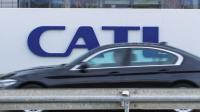Thuringia punches above its weight with battery-powered growth

The announcement of a €1.8bn lithium-ion battery production facility in Thuringia by China's CATL has put the small German federal state on the map.
Growing global demand for electric vehicles has led automotive manufacturers to shift production away from internal combustion vehicles, creating opportunities for battery producers in the process. As Europe’s largest automotive producer, Germany was a natural choice of destination for a new lithium-ion battery production facility for the world’s largest producer, China-based Contemporary Amperex Technology (CATL).
The Chinese producer of battery cells for electric vehicles announced the fifth largest greenfield investment ever made in Germany, according to greenfield investment monitor fDi Markets. CATL’s €1.8bn of planned investment was an expansion on an original figure of €240m, due to greater-than-expected future battery demand, according to electric mobility news service Electrive.
The plan to set up one of Europe’s largest battery factories in Arnstadt, a town of 28,000 inhabitants near to Thuringia’s capital Erfurt, has been met with some ambivalence, as is often found with Chinese investment in Germany. Nonetheless, locations across Europe’s powerhouse economy vied for CATL’s factory, which is due to start production at the end of 2021 and create an estimated 2000 jobs.
Logistical choice
The key reason for CATL’s decision to invest in Thuringia was so the company could ensure short logistic channels to major automakers such as Volkswagen, Daimler and BMW, according to Andreas Krey, CEO of the state development corporation of Thuringia (LEG). Arnstadt is strategically located near two major motorways and Erfurt, which is one of the major nodes within Germany’s network of high-speed trains (known as ICE), enabling easy transit to major cities such as Berlin, Frankfurt and Munich.
Officials are hoping to use this ICE connection to boost the relatively nascent tourism sector in Erfurt compared with other eastern German cities, with three new hotels due to be operational by 2022. Some real estate developers typically focused in the larger German cities have also noticed the future potential of Erfurt due to its central location.
Historically Thuringia has had the most success in attracting manufacturing projects, which make up 63% of the 149 greenfield FDI projects announced since 2003, according to fDi Markets, ranking it 11th out of the 16 German federal states. The one-third (32.4%) of Thuringia’s population that works in manufacturing industries is higher than the German national average, according to Eurostat, and Thuringia has a long industrial tradition like many other parts of Germany, with strength in sectors such as life sciences, automotive parts, the food industry and optical technologies.
Skill shortage?
Thuringia also punches above its weight in terms of greenfield investment per capita, ranking eighth in Germany. Despite a strong focus on public R&D, however, the aggregate expenditure on R&D in Thuringia was both below the average for Germany and the EU28 member states in 2015, while the percentage of 30- to 34-year-olds with tertiary-level education in 2017 was significantly below the national average, indicating some shortages in skilled labour.
Regional state elections held in Thuringia in October 2019 demonstrated the increasing polarisation seen across German politics. The socialist Left Party became the strongest party for the first time, with 31% of the vote, followed by the far-right Alternative for Germany Party with 23.4%, demonstrating the largest increase in voter share of any political party. Whether this outcome will affect future investment prospects remains to be seen.

Global greenfield investment trends
Crossborder investment monitor
|
|
fDi Markets is the only online database tracking crossborder greenfield investment covering all sectors and countries worldwide. It provides real-time monitoring of investment projects, capital investment and job creation with powerful tools to track and profile companies investing overseas.
Corporate location benchmarking tool
fDi Benchmark is the only online tool to benchmark the competitiveness of countries and cities in over 50 sectors. Its comprehensive location data series covers the main cost and quality competitiveness indicators for over 300 locations around the world.
Research report
fDi Intelligence provides customised reports and data research which deliver vital business intelligence to corporations, investment promotion agencies, economic development organisations, consulting firms and research institutions.
Find out more.




